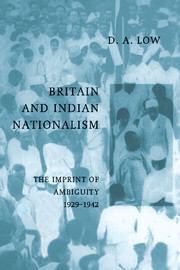Book contents
- Frontmatter
- Contents
- Maps
- Preface
- List of abbreviations
- 1 Introduction: contemporary encounters
- 2 Vortex debate: the purna swaraj decision 1929
- 3 Holds barred: anatomy of a satyagraha, Lucknow, May 1930
- 4 Peace with conflict: the Gandhi–Emerson talks, March–August 1931
- 5 Thrust and parry: the Mahatma at bay, 1932–1933
- 6 Which way ahead? Nehru and Congress strategy 1936–1937
- 7 The spider's web: Congress and provincial office 1937–1939
- 8 Working with the grain: Sir Tej Bahadur Sapru and the antecedents to the Cripps Declaration 1942
- Biographical notes
- Index
1 - Introduction: contemporary encounters
Published online by Cambridge University Press: 13 October 2009
- Frontmatter
- Contents
- Maps
- Preface
- List of abbreviations
- 1 Introduction: contemporary encounters
- 2 Vortex debate: the purna swaraj decision 1929
- 3 Holds barred: anatomy of a satyagraha, Lucknow, May 1930
- 4 Peace with conflict: the Gandhi–Emerson talks, March–August 1931
- 5 Thrust and parry: the Mahatma at bay, 1932–1933
- 6 Which way ahead? Nehru and Congress strategy 1936–1937
- 7 The spider's web: Congress and provincial office 1937–1939
- 8 Working with the grain: Sir Tej Bahadur Sapru and the antecedents to the Cripps Declaration 1942
- Biographical notes
- Index
Summary
Damn the Americans. Why don't they tyrannize us more?
Manuel Quezon, President of the Philippines SenateThe Gandhis and the De Valeras would have long since entered heaven had they been born in one of the French colonies.
Ho Chi-minh, L'Humanité, 25 May 1922There is no more slippery customer than the British Government. The British Government are past masters in the art of political chicanery and fraud, and we are babes at their game. We can never in future listen to any declaration unless action follows.
Jawaharlal Nehru, January 1931On 8 November 1927 Lord Birkenhead, Britain's Secretary of State for India, announced the appointment of a statutory commission under the chairmanship of the Liberal politician, Sir John Simon, to review the Indian constitution. No Indian was appointed to it. The Indian nationalist elite of all colours was outraged, and over the next two years there built up in India the potential for another major countrywide agitation of the kind that Gandhi had led in the early 1920s. In October 1929, in an attempt to preempt this, the Viceroy, Lord Irwin, formally declared that in the British view ‘the natural issue of India's constitutional progress … is the attainment of Dominion Status’, and announced the calling of a Round Table Conference in London on constitutional reform. This, however, served to assuage very few, and in March 1930 Gandhi launched the Indian National Congress upon a major Civil Disobedience campaign.
- Type
- Chapter
- Information
- Britain and Indian NationalismThe Imprint of Amibiguity 1929–1942, pp. 1 - 40Publisher: Cambridge University PressPrint publication year: 1997



